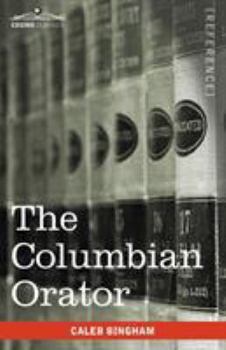The Columbian Orator: Containing a Variety of Original and Selected Pieces Together with Rules Calculated to Improve Youth and Others in the
Select Format
Select Condition 
Book Overview
An 1797 publication of Enlightenment era thought, read by virtually every American schoolboy in the early 19th century First published in 1797, The Columbian Orator helped shape the American mind for... This description may be from another edition of this product.
Format:Paperback
Language:English
ISBN:1605202959
ISBN13:9781605202952
Release Date:March 2011
Publisher:Cosimo Classics
Length:306 Pages
Weight:0.20 lbs.
Dimensions:0.7" x 5.5" x 8.5"
Customer Reviews
4 ratings
Good Service!
Published by Thriftbooks.com User , 15 years ago
I found the product to be in good shape and it was shipped per the seller's specifications. I would purchase from this seller again.
The Power of one Book; the power of one Speech
Published by Thriftbooks.com User , 15 years ago
Touted as Frederick Douglass' favorite book, "The Columbian Orator" is a great deal more than that. This collection of speeches presented in two parts, (the first part consisting of the original collection and the second part a bonus consisting of modern speeches added to the original collection) not only is a very fine collection in its own right, but also was the book used to teach Douglass to read and then to go on and become one of this nation's finest orators. But more than that, it also served as the foundation for the art of forensics in the U.S. for more than a century. Douglass acquired it for fifty cents at a time when it was illegal for blacks to either buy, own, or read books. But not only did he buy it. He read it and put it to maximal use: He virtually slew slavery with it! There may be better examples of the power of one book having an impact on the world, but none have had such a direct, immediate and profound consequence in doing so as this one. I had always wondered how an illiterate slave could master the art of public speaking with such skill and with such style and flourish as Douglas did and as is exhibited in all of his speeches, but especially in his masterpiece of American oratory "What to the Slave is the Fourth of July?" And now I know: He used the "The Columbian Orator." If one reads the speeches in part one of this book carefully, it then becomes clear that Douglass, not only read them, he imbibed them; remembered them; could recite most of them from memory; and then he used them and their vocabulary; the style, and the logical construction of their arguments, as a template for developing his own style and verbal defensive skills against slavery. One can see clearly an outline of how for instance Perkins' speech on the "Eloquence of Oration" must have had a profound affect on Douglass's sense of style. Or how Everett's speech "Slavery as Barbary, a Drama in Two Acts," helped him immensely to hone his ideas about America's contradictory attitudes about slavery, etc. Many people cite Dr. Martin Luther King's "I have a Dream" speech as the finest of American oratory, but I believe nothing in the annals of American oratory even comes close to Douglass' "What to the Slave is the Fourth of July?" For anyone contemplating becoming an orator, he can do no better than to begin with this very fine volume. Every speech has something to offer. Plus there is a lot of history embedded within them, and the contexts surrounding their presentations. Ten stars
Frederick Douglass Required Reading
Published by Thriftbooks.com User , 18 years ago
Can I give more than five stars? If I could, this book would get it! If you are doing research on Frederick Douglass, this book is a must. Along with his four autobiographies, this book provides insight into the academic and intellectual development of the man who is considered the template for African American leadership. Most well read people have a favorite book, and a book that influenced them significantly. This is both for Douglass. The introduction by David Blight, which presents a sociological study and history of the originator of this 19th century American standard is worth the price of the book alone. You may even want to buy two-- one to write in, and another to keep when the first one is beat up and the pages are falling out.
The book that helped free a nation
Published by Thriftbooks.com User , 19 years ago
Written in the early 1800's Caleb Bingham's "Columbian Orator" is a compilation of addresses by the likes of Cicero, Benjamin Franklin, George Washington, etc. designed for young boys of the era to practice oratory (it also gives some interesting 19th Century advice on capturing an audience). The addresses also center around the theme of freedom and the brotherhood of humanity. It is said that Abraham Lincoln read this book as a child. But perhaps the most famous contribution of this book to American history is that a young slave named Frederick Douglass purchased this as his first book. A play in this book entitled "Dialogue Between a Master and A Slave" (where the slave has a battle of wits with his master who ends up freeing him) inspired Douglass to understand that he could fight for freedom with his MIND, thus leading to his career as a freedom fighter to end Americna slavery. I have often used this story (that is mentioned in David Blight's introductory notes and in Douglass' various bios) to inspire young people to use the power of their minds. This wisdom for the ages will inspire you also. Take a look at what made great minds like Lincoln and Frederick Douglass tick.





